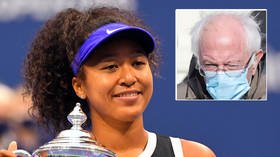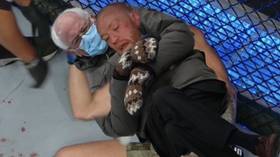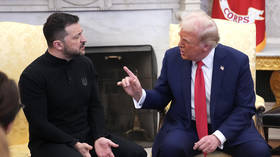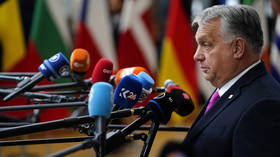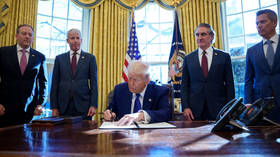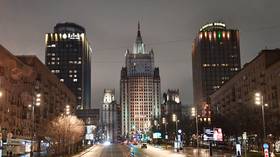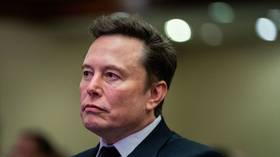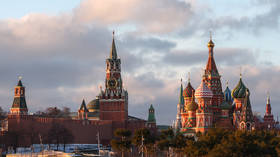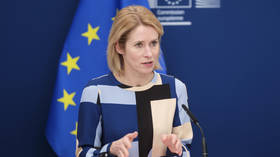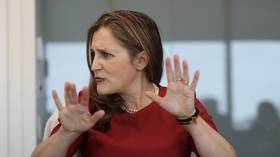‘Taking the knee can’t change systemic racism’: Ex-footballer John Barnes supports players deciding not to kneel (VIDEO)
John Barnes admits taking the knee can't "change systemic racism" and supports players finding alternatives, believing focus should be on combatting socio-political discrimination rather than isolated incidents of racial abuse.
Barnes’ career with Liverpool, where he was twice a league winner, and England inspired generations of youngsters and future footballers, and at the time of his retirement from international football he had won more England caps than any other black player with 79 appearances for the Three Lions.
The 57-year-old has been vocal on the issue of systematic racism that he believes has pervaded sporting institutions and the impact on sport of worldwide protests since the death of George Floyd in Minneapolis in May 2020.
In the wake of Floyd's death, the English Premier League adopted the gesture of taking a knee before kick off, aiming to promote racial equality and show solidarity with the Black Lives Matter movement. The decision was almost unanimously accepted but did not come without its detractors.
Several high-profile figures, including Crystal Palace’s Wilfred Zaha, labeled the action “degrading” and insisted black players should instead “stand tall”. Championship teams Bournemouth and Brentford announced in club statements they would no longer partake in the custom, saying it had “run its course”.
Les Ferdinand, a former England teammate of Barnes and now director of football at London team Queens Park Rangers – one of the first clubs to discontinue the action – said taking the knee had "been diluted" and dismissed it as a fad similar to a "fancy hashtag".
In an interview with RT Sport, Barnes agreed the gesture "cannot change systematic racism" and said he encourages players in all sports to find other avenues to do more than replicate a token gesture to highlight the issue within the game.
“First of all, taking the knee highlights the problem, and it's been highlighting the problems since the George Floyd situation," Barnes told RT Sport via Zoom.
"That's all. We can't do anything to change people's perceptions. Taking a knee, walking off or appealing or refusing to play can't change systematic racism when you have a policeman who is going to stop or shoot a black person because his perception of him, unconsciously or not, is that he's a crook.
“He's not going to think to himself, 'if I shoot or stop this black person, the LA Lakers aren’t gonna play basketball so I'm not going to do it. So all sport can do, because it's media tentative and high-profile, is highlight the problem.
"Now, we've been highlighting the problem in the Champions League, passing it around the line saying no to racism for 15 years. And nothing has changed.
“So if people feel that all they can do is highlight it, then take a knee. But if they feel they want to do more and taking a knee is a token gesture – and in many respects it is just a token gesture – if they decide not to do it because they want to do something else, I'm fine [with that].
"I wouldn't be taking a knee. However, I don't say that people shouldn't be taking a knee. But taking a knee does nothing apart from highlight the problem."
Barnes was careful to make the distinction between focussing on isolated events of racism and racial inequality, and insisted the finer details of discrimination lie much more deeply, such as the lack of available education for black people in the poorer, inner-city areas.
Racism in football has been apparent in pockets of support such as when England’s UEFA 2020 qualifier against Bulgaria in Sofia in 2019 was twice halted after the home section was infiltrated by neo-fascist groups who made monkey chants and Nazi salutes at England’s black players.
Another more prevalent but less easily manageable problem has emerged on social media, where a number of players, including Manchester United’s Anthony Martial, Arsenal’s Willian and Swansea City’s Yan Dhanda, were among those racially abused on Twitter and Instagram after poor performances for their club.
Barnes believes the problem is much deeper and says that the energy used to focus on numerous isolated incidents would be better centered on the root cause of the issue. He suggests opening a dialogue on socio-economic problems minorities face, as well as black-on-black violence in the inner-cites.
“We have to analyze or decide what we think racial inequality is. Black kids in the inner cities can't get an education, access to housing, social care and jobs and are discriminated against every single day as they walk down the street. For me, that's racial inequality," he said.
“Now, while that's what we should focus on, we should also try to stamp out racist incidents as we see them. But for that black player who talks about racial inequality, who for six days of the week, six-and-a-half days of the week, can go to the front of any line in front of white people can get into any club, any restaurant will have doors open for him – is that racial inequality?
“So we have to decide what we believe racial equality to be and what our focus has to be, from a planning perspective and a sporting perspective.
“There are enough elite people talking about getting Bulgaria banned and getting some idiots off social media. How many people are talking about the real problem where kids are killing each other in inner-cities every single day?
“We've got to stamp out bananas [being thrown] on the field, but we seem to be not only highlighting but focusing all our energy and money on trying to get Bulgaria banned and trying to get a 12-year-old football fan sent to prison or trying to get some idiot who can't spell his own name, who is happy for people to talk about him by going on social media and abusing a black.
"The real problems that are happening in the inner-cities which has kept black people down for hundreds of years and will continue to do so which are being ignored. That, for me, is what I'm interested in [working on].”
One prominent figure in the fight against inequality is Manchester United and England forward Marcus Rashford, who has campaigned for poverty-stricken UK children to receive government subsidized meals during the Covid-19 pandemic.
Barnes says more high-profile players such as Rashford should be using their platform to challenge government policy and help black people in the poorer inner-city areas, challenging disproportionate misrepresentation at a fundamental level and within the elite to benefit '99%' of blacks, rather than just '1%'.
“He's the one who's doing it," Barnes says of Rashford. "He's [saying], 'forget about race, it's an underprivileged situation whereby black kids are disproportionately represented in that sphere.
"He's talking about trying to change things for them. He's not talking about alternatives for him. And he's not also saying, I'm going to give you £20,000 of my own money.
“What he's saying is that he can use his platform to change government, principle, government policy, which he has done to then say, 'we're going to feed inner-city kids throughout the summer holidays.'
"Imagine if more black players – not just athletes, superstars – were to do that. That would help 99% of the black community. We're trying to help 1% of the black community, and the elite are not doing that. So that's not what I'm about."
As a player who inspired a generation of youngsters regardless of race, Barnes' career mirrors that of current star Rashford's in more ways than one, as the two are now engaged in combating socio-political discrimination by using their platforms as prominent sports stars. Barnes thinks to ensure the message is carried to future generations, the focus should remain on making life better in the poorest areas of society.
"It depends on what continues to happen. [Rashford could] continue to look at social issues and take on a stance, saying 'I am going to try and help the black kids in a city kids in which are disproportionately represented.'
"[He could] then say, 'well, what we need now is more black men in the boardroom, and more black managers'... forget about what's going on the inner cities, forget sports.
"This has been happening for 1,000 years: an elite group of people who wanted more power for themselves have used the people as an excuse to say, 'I will help the people by me getting more power.'"
Also on rt.com 'Liverpool aren't bad champions & Klopp won't leave! They'll still finish 2nd': Anfield legend John Barnes to RT Sport (VIDEO)


